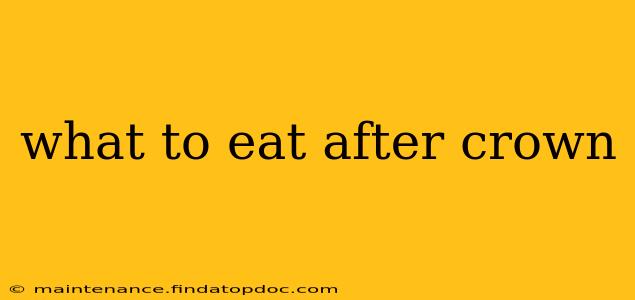What to Eat After Getting a Dental Crown? A Comprehensive Guide
Getting a dental crown is a significant step in restoring your oral health. But what you eat in the days and weeks following the procedure is crucial for its success and your comfort. This guide will cover everything you need to know about your post-crown diet.
What Can I Eat Right After Getting a Crown?
Immediately after your crown placement, your mouth might be numb. This is why it’s vital to stick to soft, cool foods for the first few hours. Avoid anything that requires extensive chewing or could irritate the sensitive area. Good options include:
- Yogurt: A creamy, easily digestible option packed with nutrients.
- Applesauce: Smooth and gentle on your gums and the newly placed crown.
- Oatmeal (thinned with milk or broth): A nourishing choice that’s easy to swallow.
- Mashed potatoes: Bland and soft, perfect for minimal chewing.
- Scrambled eggs (well-cooked): Protein-rich and easily chewed.
- Smoothies: Blend your favorite fruits and vegetables for a healthy and convenient meal.
Avoid extremely hot or cold temperatures, as these can cause discomfort and sensitivity to the crown.
What Foods Should I Avoid After Getting a Crown?
For at least the first week, and possibly longer depending on your dentist's recommendations, steer clear of these foods:
- Hard foods: Avoid anything that could chip or damage your new crown, such as hard candies, nuts, ice, popcorn kernels, and raw carrots.
- Sticky foods: These can pull on the crown and potentially dislodge it. Examples include caramel, taffy, and gummy candies.
- Chewy foods: Tough meats, bagels, and other chewy foods require significant chewing, putting unnecessary stress on your crown.
- Foods that require excessive biting: Avoid biting into hard apples, whole sandwiches, or anything that forces your jaw to work intensely.
How Long Should I Avoid Certain Foods After Getting a Crown?
The duration of dietary restrictions depends on several factors, including the type of crown, the overall health of your tooth, and your dentist's specific recommendations. However, it's generally advisable to follow a soft food diet for at least a few days, gradually introducing firmer foods as your mouth heals. Your dentist will provide personalized guidance.
What if I Accidentally Bite Down on Something Hard?
If you accidentally bite down on something hard, don't panic. Check your crown for any damage; if you notice any cracks or chips, contact your dentist immediately.
What are the Signs of a Problem with My Crown?
It's important to be aware of potential issues. Contact your dentist if you experience:
- Significant pain or discomfort: This could indicate an infection or other complications.
- Loose crown: If your crown feels loose or wobbly, seek immediate attention.
- Changes in the appearance of your crown: Noticeable chipping, cracking, or discoloration should be reported.
- Persistent sensitivity to hot or cold: While some sensitivity is normal initially, persistent sensitivity is a cause for concern.
Can I Eat Normal Food Eventually?
Yes, once your mouth has fully healed and your dentist has given you the all-clear, you should be able to resume your normal diet. However, it's always wise to maintain good oral hygiene practices and avoid overly hard or sticky foods to prolong the life of your crown.
This information is for general guidance only and does not constitute medical advice. Always follow your dentist's specific recommendations regarding your post-crown diet and care.
